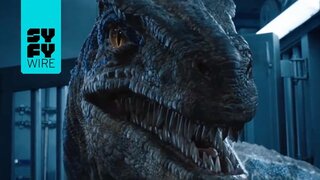Create a free profile to get unlimited access to exclusive videos, sweepstakes, and more!
When You Die May Have Been Partially Determined by Dinosaurs
Even 66 million years later, dinosaurs still have their feet on our necks.
He didn’t know it then, but from the moment John Hammond (Richard Attenborough) dreamed up Jurassic Park, there was blood on his hands. The invitation extended to doctors Sattler (Laura Dern), Grant (Sam Neill) and Malcolm (Jeff Goldblum) to visit his little park was tantamount to a death threat with a smile.
By the time we reached Jurassic World Dominion (streaming now on Peacock) there were dozens of people whose on-screen deaths were directly determined by Hammond’s dinosaurs. In the real world, new research suggests that the date of your own death might be indirectly determined by the prehistoric existence of dinosaurs.
RELATED: Some Dinosaurs Slept Like Modern Birds and it’s Cute as Hell
In a new paper published in the journal BioEssays, João Pedro de Magalhães from the Genomics of Ageing and Rejuvenation Lab at the University of Birmingham suggests that dinosaurs may have left an evolutionary legacy in our life expectancy.
Some Animals Live a Single Day While Others Live Thousands of Years
The average human lifespan (at the time of writing, it’s going up bit by bit all the time) is about 73 years. You generally get seven decades, which isn’t too bad compared to some other animals. Our beloved cats and dogs, for instance, usually get a couple of decades on the outside. To them, we must seem like unchanging, immortal beings but we are far from the longest-lived creatures.
There is some evidence that some species of whales can live a couple hundred years, but that’s apparently the maximum for mammals. Meanwhile, some non-mammalian animals live quite a bit longer. Under ideal conditions, some sharks can live for half a millennium and there are sponges in the world’s oceans which have been alive since before the advent of human civilization, 10,000 years or more. By those standards, we’re little more than a flash in the pan, and it might be the dinosaurs’ fault.
How Dinosaurs May Have Shortened Our Lives
As far as we can tell from the fossil record, mammals first emerged about 200 million years ago, smack in the thick of the reign of dinosaurs. During that time, mammals were mostly small rodent-like creatures which scurried across the landscape hoping to stay unnoticed by the lumbering creatures overhead. For the next 140 million years – most of the history of mammals – dinosaurs were the dominant predators in our environment.
RELATED: Discovery of Freshwater Plesiosaurs Makes Loch Ness Monster ‘Plausible’
It’s possible, de Magalhães suggests, that evolutionary pressure from dinosaurs pushed those early mammals toward faster lifecycles with earlier reproductive periods. The evolutionary benefit is in pumping out the next generation as quickly as possible before you get eaten. It’s the Zergling Rush philosophy of survival, you don’t have to be big or strong if you can be fast.
These changes might have made our mammalian ancestors better at surviving in a dinosaur-dominated world and helped them to make it through the apocalyptic extinction events of 66 million years ago, but at a cost. We came through the eye of that needle carrying over 100 million years of evolutionary baggage telling us to reproduce and die quickly. Some mammal species, including us, have pushed against that pressure to extend our lives, but we’re doing it with an evolutionary ball and chain around our ankles, if de Magalhães is right, because we came up in a world filled with big, sharp-toothed monsters.
Even knowing that, we can’t help but love dinosaurs. Catch Jurassic World Dominion, streaming now on Peacock.
































